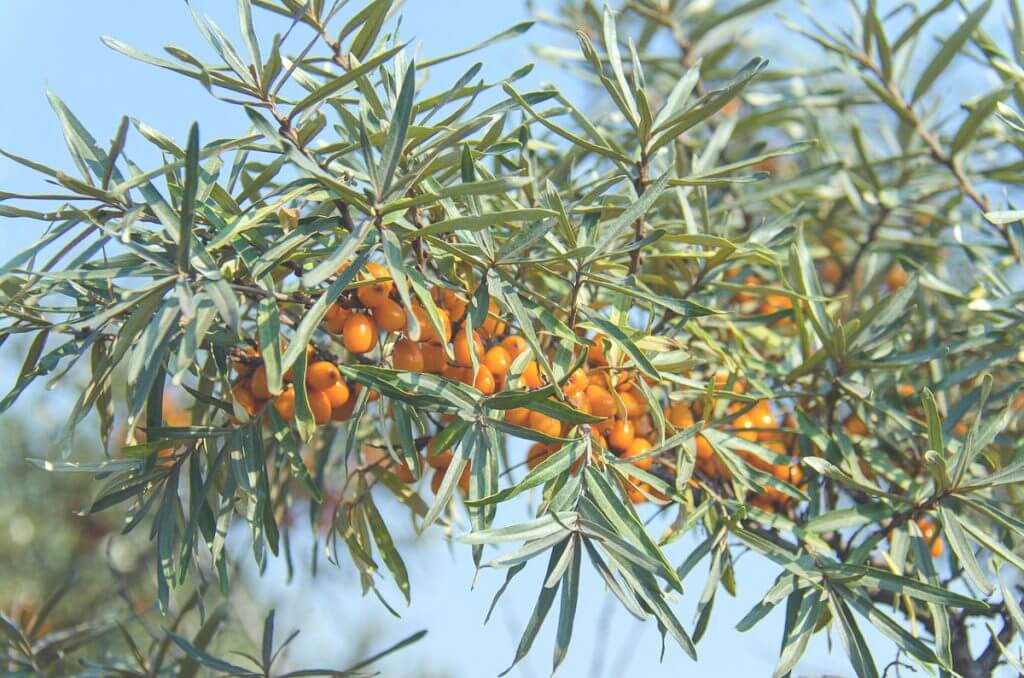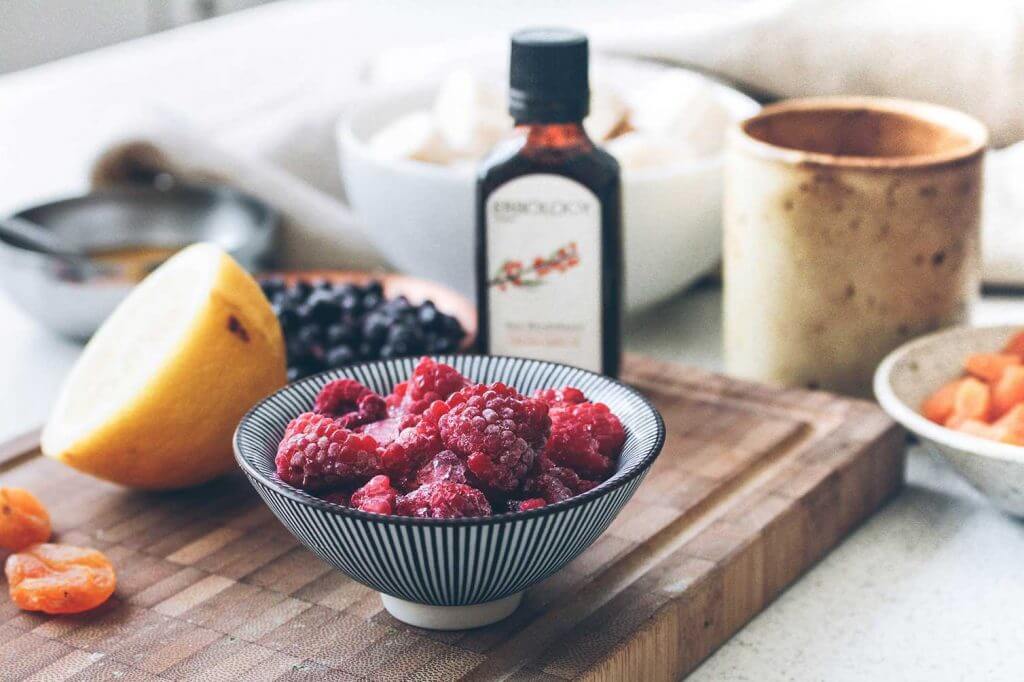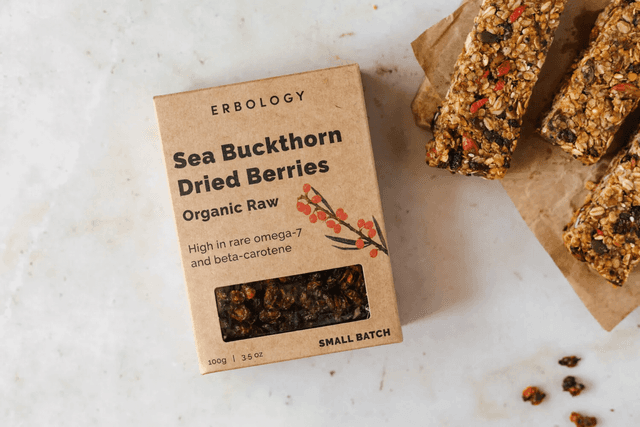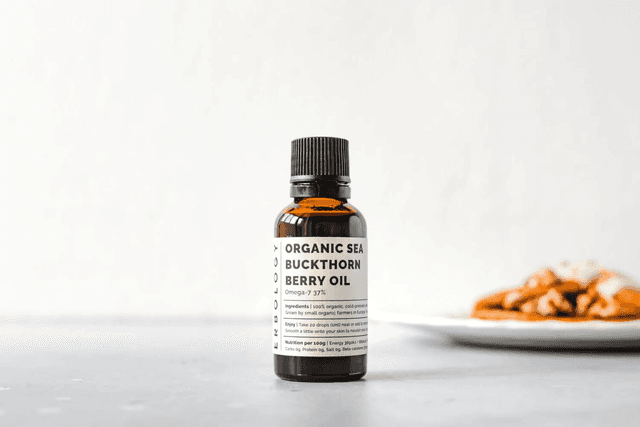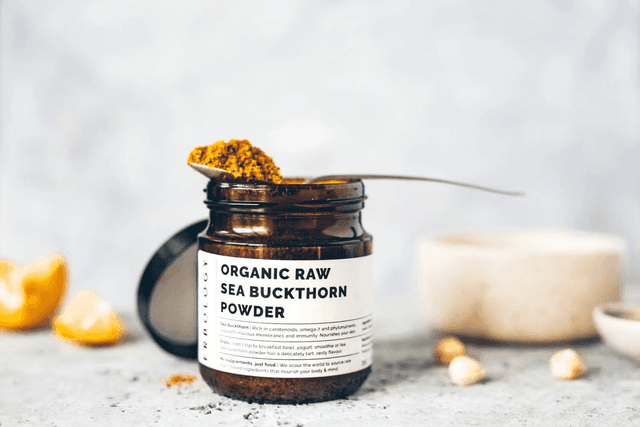26 Feb 2021
Sea buckthorn FAQs
What are the benefits of sea buckthorn?
This bright little berry comes packed with nutrients which give it some impressive health benefits. As an overview, sea buckthorn is thought to support your immune system and protect your skin, eyes and mucous membranes.
The main healthy nutrients in sea buckthorn are vitamins C and E, folate, beta-carotene and omega-7.
Luckily for you, we have a full article dedicated to the benefits of sea buckthorn, along with its history and nutrients.
How to take sea buckthorn?
Really, it depends on which benefits appeal to you most. At Erbology, we make four different sea buckthorn products, which we recommend for slightly different results.
For example, if you would like to use sea buckthorn for its incredible quantity of vitamin C, we’d recommend drinking the juice. We make this in a 40ml shot or in a larger 250ml bottle, if you like to drink it every day. Lots of people also love using sea buckthorn juice in baking or cocktail making, as it’s a fantastic flavour.
We also stock dried sea buckthorn berries. These contain vitamins C and E and folate, which is the naturally-occurring form of folic acid. They are great for stirring into your porridge or sprinkling over salads.
Similarly, we make sea buckthorn powder which is simply crushed, dried sea buckthorn berries, with the seeds removed. It is really convenient and easy to use. You can add a spoonful of sea buckthorn powder to just about anything, from breakfast bowls to baking, so it’s probably the easiest way to get some sea buckthorn into your diet.
Finally, we make sea buckthorn berry oil. The oil is rich in beta-carotene and omega-7, which are fabulous for your skin, eyes and mucous membranes.
You can take it neat, drizzle it over yoghurt or porridge, or dilute it in a carrier oil and apply it directly to your skin.
The oil is also the product we recommend for easing symptoms of the menopause, as it is particularly high in omega-7 which helps care for your mucous membranes.
Related reading
Will sea buckthorn clog pores?
Sea buckthorn oil scores a 1 out of 5 on the comedogenic scale, which means it’s very unlikely to clog your pores.
The scale ranges from 0 (completely non-comedogenic) to 5 (likely to clog your pores). So, you can see that sea buckthorn ranks very low on the scale and most skin types are likely to be able to tolerate it.
It absorbs easily into your skin and contains lots of skin-loving nutrients. So, if you’d like to add it to your skincare routine, you can do so without worrying about breakouts.
This is true for all skin types, from dry to oily.
Can sea buckthorn cause acne?
Consuming sea buckthorn, or applying sea buckthorn oil topically, is very unlikely to cause acne. Indeed, it may be beneficial for acne sufferers.
Acne is often caused by an increase in sebum (skin oils) thanks to changes in your hormones.
If you suffer from acne, you should be especially mindful of the comedogenic scale and look for skincare which won’t contribute to blocking your pores. As mentioned above, sea buckthorn oil is widely tolerated.
What’s more, some studies suggest that sea buckthorn can actually help fight acne. One study found that a topical skincare cream containing sea buckthorn extract had anti-sebum secretion effects over the eight week observation period.(1)
Meanwhile, a summary of the active ingredients in sea buckthorn found that the oil treats eczema, reduces spots, acne and skin inflammation.(2) This might be to do with its high concentration of linoleic acid; acne sufferers often show a decrease in linoleic acid, which is linked to increased breakouts.
In conclusion, if you suffer from acne, sea buckthorn oil is likely to be more of a friend than a foe!
Does sea buckthorn oil stain your skin?
Sea buckthorn oil has a vivid yellow to orange colour. Rest assured, though, it will not stain your skin if you use it as part of your skincare routine!
It will, however, give your skin a yellow/orange tinge while you have it on. Because of this, most people like to use it before they go to bed and leave it on overnight. You can safely wash it off in the morning without leaving any pigment on your skin.
You should be careful with your sheets, pillow cases and clothing, however, as sea buckthorn will also impart its colour to these. If you like to use it overnight, we recommend choosing a dark-coloured pillow case.
You can also reduce the vibrancy of the colour by diluting it in a carrier oil. Choose a non-comedogenic oil such as hemp seed or sweet almond oil, which have their own benefits for your skin, too.
